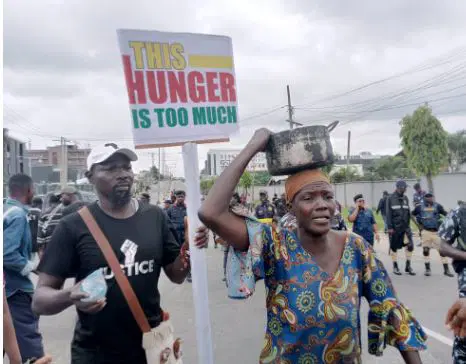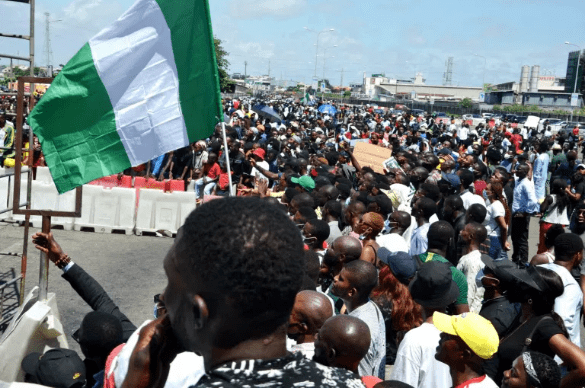Africa
The Safety Valve of Society, by Bilyamin Abdulmumin, PhD

In the 25 years of our current uninterrupted democracy, four significant protests stand out: the 2007 protest against fuel price hikes, the 2012 Occupy Nigeria movement, the 2020 EndSARS demonstrations, and the looming protest against hunger.
When Olusegun Obasanjo’s tenure ended, he bid the public goodbye with an unpopular move: increasing the pump price from 65 to 75 naira. Among the ensuing protestors, one placard was ridiculous: “Return the old price or there will be a revolution.” Imagine, adding just 10 naira to the pump price and someone was calling for a revolution. I wonder what that person would call for now.

Why would President Obasanjo end his tenure with a bitter pill for the public? This remains a puzzle I still cannot piece together. Isn’t it when leaders come to leave power that they show the greatest love for the masses? Perhaps this was Obasanjo’s way of punishing us for rejecting his third-term agenda. Maybe he wanted to give his successor, Yaradua, a golden baton by allowing him to reverse the pump price, a gesture for which he is still remembered. Anyway, let me not overthink.
The Occupy Nigeria in 2012 is still fresh in our memory, GEJ love lost with Nigerians reached its crescendo giving rise to Boko haram and a pile of allegations of corruption under his watch as if that was not enough, the peacemaker and true statesman threatened to jack up the pump price to 145 nairas, the opposition would just found the straw they were looking for, together with many Nigerians they lock down the nation in the protest. Currently, Tinubu admits to being involved in this and several other protests but he tempered them with fragrance by emphasizing that they were peaceful protests.
Like many protests, ENDSARS in 2020 didn’t get momentum in the north thanks to clerics’ admonishing. The trouble is that in the Hausa language protests, demonstrations, and riots are perceived the same. So whenever there is a call for one, riots readily come to mind, which is outrightly prohibited by both scripture and culture. But I found one explanation from an Imam plausible, he said that it is not a peaceful demonstration that was forbidden but what it usually leads to: havoc, looting, and sometimes even loss of lives.
We, therefore, cannot afford to throw a baby with the bath water, there is a need to come up with a way to conduct a peaceful demonstration void of wreaking havoc, because a demonstration is one of the safety valves of society, whenever enough tension is built demonstrations can act as a vehicle to bring down the tension. One radical idea is to borrow a leaf from developed nations like England, there should be places like the famous Hyde Park London also known as speakers’ Corner, where every grieved Nigerian can go there to voice out their frustrations. We can also have a sort of Ground Zero of New York City where the bereaved gather relieving their grievances and console each other. But most importantly are the safety valves of good governance, employment, recreational and vocational development and vocational, welfare and justice.
The earlier in the list of protests in Nigeria are June 12, SAP, and Ali Must Go, the former one is worthy of discussion. After the push of Nigerians came to shove, the then-military regime toyed with the idea of releasing the power to civilians. Because of several dribbles of public attention and back and forth, IBB would be nicknamed Maradona, which he later padded with air freshener, he said Maradona (Argentina) was playing against just 11 players but he as the president was fighting with millions of Nigeria.

Finally, June 12 was set for the general election; in an unprecedented show of unity, Nigerians en masse elected MKO as president of Nigeria, but only for the military regime to turn down the verdict. Fortunately/unfortunately, the event coincided with the peak of students, and academic unionism would, alongside the politicians and other pressure groups short down the country. Some overzealous went as far as hijacking the plane flying from Lagos to Abuja, diverting it to Niamey, and threatening not to release the plane and hostages until MKO was declared winner of the June 12, 1993, general election.
This episode is reminiscent of Entebbe Operation, in Entebbe Operation that occurred in 1976, the Air France traveling from Tel Aviv to Paris would be hijacked and diverted to Entebbe, Uganda; where the hijackers demanded the release of 40 Palestinians. That incident became an international sensation thanks to Israel’s successful operation -like in the blockbuster movie, to rescue all the hostages.
The stand-up of the June 12 movement against the military led to the imprisonment of several activists and claimed many lives, including those of Kudirat Abiola and, later, MKO Abiola himself. To commemorate this event, the Nigerian government changed Democracy Day to June 12, 2018. Although the military officially handed over power to a civilian government on May 29, 1999, the government of the day recognized that no date in Nigerian history symbolized democracy more than June 12. According to this view, democracy was truly restored on June 12, it was only denied.

























